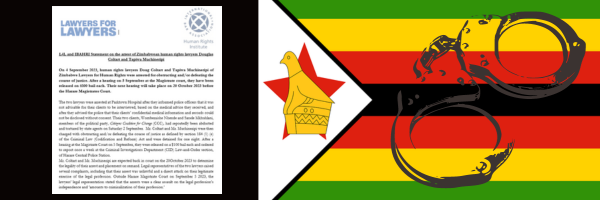Zimbabwe: IBAHRI issues joint statement condemning arrest of human rights lawyers

The International Bar Association’s Human Rights Institute (IBAHRI) and Lawyers for Lawyers (L4L) have issued a joint statement condemning the arrest of Zimbabwean human rights lawyers Douglas Coltart and Tapiwa Muchineripi and calling for authorities to drop all charges against them. The two men were arrested on 4 September 2023 at Parktown Hospital, Harare, on charges of obstructing and/or defeating the course of justice for refusing police access to their clients (members of the political party Citizens Coalition for Change) on medical grounds.
Human rights lawyers are increasingly being targeted by Zimbabwean authorities for their involvement in electoral cases. The arrests of Mr Coltart and Mr Muchineripi follow the assault of prominent human rights lawyer Obey Shava in July 2023.
The IBARHI and L4L call on the Zimbabwean authorities to drop all charges against human rights defenders and guarantee that all lawyers in Zimbabwe are able to carry out their legitimate professional activities without fear of reprisals, harassment, persecution or undue interference.
The full statement is below.
L4L and IBAHRI Statement on the arrest of Zimbabwean human rights lawyers Douglas Coltart and Tapiwa Muchineripi
On 4 September 2023, human rights lawyers Doug Coltart and Tapiwa Muchineripi of Zimbabwe Lawyers for Human Rights were arrested for obstructing and/or defeating the course of justice. After a hearing on 5 September at the magistrate court, they have been released on $100 bail each. Their next hearing will take place on 20 October 2023 before the Harare Magistrates Court.
The two lawyers were arrested at Parktown Hospital after they informed police officers that it was not advisable for their clients to be interviewed, based on the medical advice they received, and after they advised the police that their clients’ confidential medical information and records could not be disclosed without consent. Their two clients, Womberaishe Nhende and Sanele Mkhuhlani, members of the political party, Citizens Coalition for Change (CCC), had reportedly been abducted and tortured by state agents on Saturday 2 September. Mr. Coltart and Mr. Muchineripi were then charged with obstructing and/or defeating the course of justice as defined by section 184 (1) (e) of the Criminal Law (Codification and Reform) Act and were detained for one night. After a hearing at the Magistrate Court on 5 September, they were released on a $100 bail each and ordered to report once a week at the Criminal Investigations Department Law-and-Order section, of Harare Central Police Station.
Mr Coltart and Mr Muchineripi are expected back in court on 20 October 2023 to determine the legality of their arrest and placement on remand. Legal representatives of the two lawyers raised several complaints, including that their arrest was unlawful and a direct attack on their legitimate exercise of the legal profession. Outside Harare Magistrate Court on 5 September 2023, the lawyers’ legal representation stated that the arrests were a clear assault on the legal profession’s independence and ‘amounts to criminalization of their profession’.
Lawyers for Lawyers and the International Bar Association’s Human Rights Institute are extremely concerned by the arrest of Mr. Coltart and Mr. Muchineripi. Notably in the context of elections, human rights lawyers in Zimbabwe have increasingly been targeted. In July 2023, prominent human rights lawyer Mr. Obey Shava was gravely assaulted in front of his law firm (L4L and IBAHRI statement). Prominent advocate and CCC MP Fadzayi Mahere was also convicted on 5 April 2023 of issuing a false statement ‘undermining public confidence in a law enforcement agency’ for a social media post criticising police brutality.
More generally, the arrests of, and restrictions placed upon, a number of Zimbabwean lawyers limiting their freedoms to carry out their profession since the beginning of 2020 have become frequent and alarming (ZLHR and L4L report on Zimbabwe). We emphasise that lawyers play a vital role in the protection of the rule of law and human rights. Their work is indispensable for ensuring effective access to justice for all. To fulfil their professional duties effectively, lawyers should be able to practice law independently in accordance with recognised laws, standards, and ethics. Lawyers should be free from improper interference, any fear of reprisals, or unreasonable restrictions. Where improper interference or reprisals become widespread and systematic, a chilling climate emerges in which lawyers may refuse to represent clients connected to politically sensitive or controversial issues out of fear of becoming the target of harassment or acts of retaliation.
Principle 16 of the UN Basic Principles on the Role of Lawyers states that ‘Governments shall ensure that lawyers (a) are able to perform all of their professional functions without intimidation, hindrance, harassment, or improper interference; and (c) shall not suffer, or be threatened with, prosecution or administrative, economic or other sanctions for any action taken in accordance with recognized professional duties, standards and ethic’.
L4L and IBAHRI, therefore, call on the Zimbabwean authorities to:
drop all charges against human rights defenders, including lawyers Mr. Coltart and Mr. Muchineripi, as they are being targeted as a result of their peaceful and legitimate work;
refrain from any actions that may constitute harassment, persecution, or undue interference in the work of lawyers, including their criminal prosecution on improper grounds such as the nature of the cases in which the lawyer is involved; and
guarantee that all lawyers in Zimbabwe are able to carry out their legitimate professional activities without fear of reprisals and free of all restrictions including judicial harassment arbitrary arrest, deprivation of liberty, or other arbitrary sanctions.





























